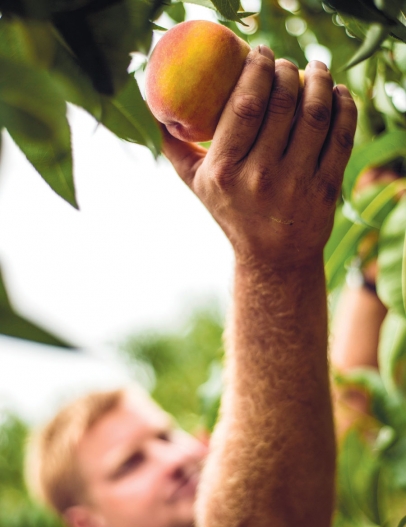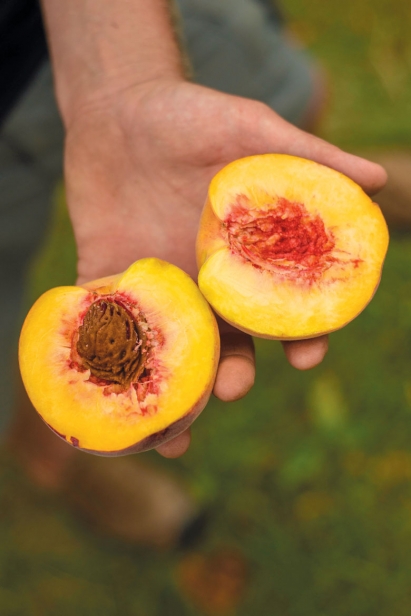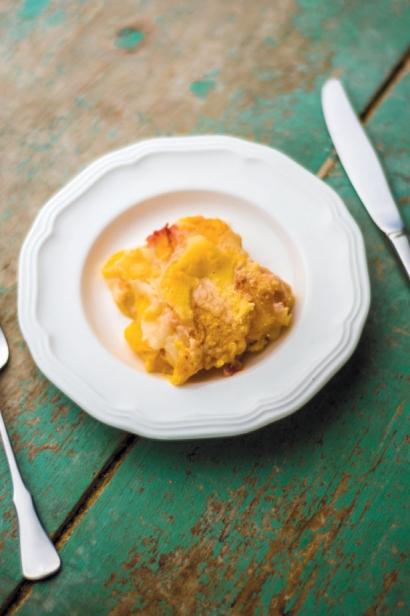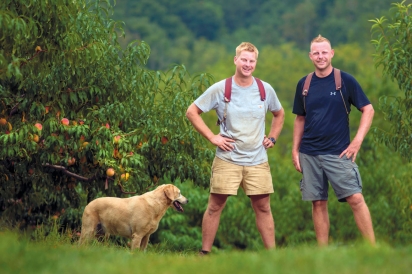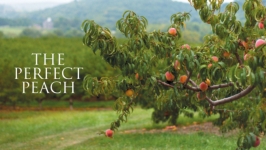Picking the Perfect Peach
Scholl Orchards gets it right every time
Imagine the quintessential peach. It bears a bit of a blush, with a sunny yellow background. It’s symmetrical, about the size of a baseball, with a sweet smell. It yields to the gentle press of your thumb. When you find such a specimen, there’s only one thing you must do: Eat it immediately. And there’s only one way to eat this piece of fruit: right over your kitchen sink so the juices can drip down your hands and chin into an easily cleaned vessel. Farmers have a term for this. “They’re ‘sink’ peaches,” says 35-year-old Ben Scholl of Scholl Orchards in Bethlehem.
During their short summer season, sink peaches such as these are likely growing within driving distance of your house, though it’s also possible you’ve never had one. Supermarket peaches are hard and pale with almost no peachy smell. They have nothing on those grown at third-generation family-run Scholl Orchards. Once known for its apple orchards, Scholl’s has of late expanded. The family’s farm stand is nothing more than a glorified shed, with a footprint they can’t change, says Ben, but “we always knew our business could be more.” And the exploding popularity of farmers’ markets gave them exactly that opportunity to do more, starting with the Easton Farmers’ Market in 2012.
For the past three winters, the Scholls have moved indoors to Easton’s winter market, sustaining their business—and their customers—with 20 to 25 varieties of apples, sweet-tart apple cider and the most velvety applesauce I’ve ever sampled, along with potatoes, onions and winter squashes. At winter’s end, the Scholl brothers pack up and disappear from the market for a few months. Their return sometime in late June or early July is eagerly anticipated because it signals that the peaches are coming.
Those pristine sink peaches really get people crazy. When you have a nearly flawless agricultural specimen, one that resembles a beautiful botanical drawing and possesses a textbook taste to match, everything else is a disappointment.
Ironically, peaches are a relatively recent addition to the Scholl’s mix. The family began farming in the late 1940s with just three acres in Bethlehem, selling apples and cider; it was a side business, one they never intended to become their livelihood.
Jake and Ben Scholl, who run the farm now, recall their grandfather, Reginald Scholl, farming after his day job. Their father, George, did the same. The family acquired a piece of farmland in Kempton in 1982 and, later, that farm’s existing barn and quintessential Pennsylvania stone farmhouse; their Kempton farm now totals around 42 acres.
“We are third-generation, but Ben and I are really the first generation of full-time farmers,” says Jake, 32. He recalls how his dad would leave their vacation at the Jersey Shore and drive several hours to Kempton to tend to the peach trees. “I’d always go with him, because I felt bad that he was going by himself,” says Jake. He also recalls being dropped off at the farm after school to whack weeds.
Little did he know that doing these chores would prep him for his eventual career. When Jake was in high school, he and his father sat and planned out the future, and it was full of peach trees. “He wanted nothing more than for us to take the business,” he says. But Ben resisted for a long time, working in construction for several years before coming to the farm full-time in 2010.
It wasn’t a decision either Scholl brother made lightly; farming is less a job than a life-consuming project. Ben and Jake typically cannot take a day off between July and October, the height of the season for peach farmers. That pace won’t let up until early October, after the summer harvest is over, peaches have called it quits, and the squashes and apples have taken center stage. “We have about four months to make most of our money,” says Ben.
Unlike many other crops, peaches require constant care and picking. The way the Scholls do it, the season means 16-hour days and ten to 12 weeks of backbreaking, all-out intensity. Seriously. These otherwise young and hardy guys both have degenerative disc disease as a result of their work.
Daily activities during those exhausting months are limited to sleeping, picking, packing and delivering. “Market days are like a tornado,” says Ben. “It’s five of us, three trucks, and five pallets.” The peaches—and other items—are packed, loaded and driven about 40 miles to Easton from their farm in Kempton, on Wednesday nights and Saturday mornings.
The expansion of the Easton Farmers’ Market to include a Wednesday night market in 2013 provided the Scholls with access to even more customers, but it’s a delicate balance. They can’t grow much more than the 405,000 to 540,000 pounds of peaches per year they are already growing. “We cannot do more in volume and keep the quality. We’re maxed out in that regard,” says Jake.
The brothers are so obsessively peach-oriented that Jake proposed to his wife, Jessie, an art teacher, in the middle of the orchard, peaches in hand. She tells this story after she hands me a plate of peach cobbler, a family recipe. When asked how many types of peaches they grow, Jake jokes, “Too many.” And while he may feel that way during the grueling height of the season, the brothers are firmly attached to each of the 40 different varieties of peaches they cultivate.
Farmers will tell you that every fruit and vegetable presents its own particular challenges, but peaches are notoriously difficult to get right. “All of our grower friends think we are nuts,” says Ben, laughing. “But, financially, we do a lot better than they do. There’s a saying among farmers, ‘Apples for health, peaches for wealth.’ ” Customers are more than happy to hand over five to six dollars per quart for these fine specimens—or their nectarines, “a fuzzless peach,” as Jake calls it.
So what exactly makes their peaches so different?
“Most of the growers we know pick their peaches green. They don’t let them ripen on the tree,” Jake says. When they ripen on the tree, the fruit is much sweeter, the flavor more floral and complex; the antioxidant count is higher, too. “Ninety-eight percent of where the flavor comes from is related to how long it stays on the tree,” he says.
Another aspect of picking that makes it so labor-intensive is that the Scholl brothers, along with a tiny, trusted crew of about three others, will return to a tree multiple times over the course of several days. “Most farms would rather strip the tree five days early, pack the peaches and ship them,” Jake says. But it’s that extra time that results in superior-tasting fruit.
It’s also not so easy to determine when they are mature. Jake says it depends on the variety. “Some have more of a coral finish, others have a blush. It’s just this sense we have in our head,” he says. Basically, you need to look for a yellow background, with a splotchy blush emerging across the peach. The fruit should fit in your palm. If the peaches are clinging tightly to their branches, they’re not ready yet. The peach should come off easily. “And if you see the tree has dropped a few on the ground, it’s ready,” says Jake.
When you pick a fruit that’s ripe, handling needs to be delicate. As we’re talking in the fields, I notice the artful way Ben and Jake pack the peaches in the crate, making adjustments according to hairline degrees of ripeness. I watch Ben situate a peach that is a little softer to the top of a row he had started, and continue to shift it around until the crate is full and that peach is unscathed. He puts the firmer ones toward the edges, and the softer ones on top. It’s like playing Tetris. It’s also why Scholl Orchards seconds—the slightly less than perfect fruit—are better than most farms’ first-string yield, and are coveted by home canners.
After the peaches are picked, they’re crated and briefly placed in a cold storage room whose chill “pulls the heat out of the peach” as Ben describes it, halting the ripening process without destroying the texture or flavor. Or the startling aroma, which is intensely concentrated, floral and, well, peachy.
The same care the brothers use when packing and storing is also applied to the way they fill their quart-size baskets at the markets—the ripest ones are on the top, so that by the time you work your way through the basket, a couple days have passed and the very last peach is ripe. It’s an elegant and simple system that produces little waste, and it reveals a fastidious attention to detail that’s rarely encountered.
When it comes to day-to-day affairs, Jake and Ben split the duties. Ben and his wife Sofia, who also assists at the Easton Farmers’ Market, live in Bethlehem, close to the smaller family farm there, and Jake and his family live on the Scholl homestead in Kempton. Jake points to their location as a key to success. The trees grow in the area’s sandy, loamy soil, which is perfect for peaches, according to Jake, who moves the dirt around at the base of a tree with the toe of his work boot to illustrate.
Ben and Jake live roughly 45 minutes away from each other, but this makes it easier for them to split up travel through the region. Ben is closer to the farmers’ markets and restaurants in the Lehigh Valley during the demanding summer months, and Jake more intimately manages the farm. Make no mistake about it, however: They both have unrivaled expertise in spotting, picking and packaging the perfect peach. “I have dedicated my life to this,” says Jake. The proof is in the fruit and, in this case, the peach cobbler, too.
“We are giving the public what it deserves—a good piece of fruit,” says Ben. It’s as simple—and complicated—as just that.


